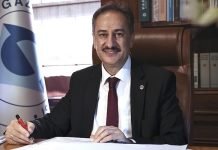Mustafa Karasu, the Executive Committee Member of the outlawed Kurdistan Workers’ Party (PKK) has claimed that the PKK has imprisoned 20 Turkish officials including 2 high ranking intelligence officers of Turkey’s National Intelligence Organization (MİT).
Speaking to Dengê Kurdistan radio, Karasu has reportedly stated that “It has been in the media too, as announced before we do have the MİT members. But it’s not just the 2 men. 20 state officials are prisoners with us. The 2 MİT members most recently captured are high ranking members of the MİT. Before them, we captured two of their regional supervisors in Cizre, Botan. They sent messages to us for them as well. The state (Turkey) and Erdoğan (Turkey’s autocratic President Recep Tayyip Erdoğan) never talk about these things.”
Claiming that “The capture of these MİT members is the capture of the state and Erdoğan,” Karasu has also stated “It is the hunter becoming the hunted.”
Diyar Xerîb, General Presidential Council member of the Kurdistan Communities Union (KCK), an umbrella organization that encompasses the outlawed PKK had confirmed on Monday that they have captured some MİT operatives in northern Iraq. Xerîb had told Rojnews that “Turkey should be glad we haven’t shown the people [MİT agents] we captured in the media yet. We could just parade them to the press now and publish their names.”
Speaking about Turkey’s recent deportation of Patriotic Union of Kurdistan (PUK) Ankara representative Behroz Gelali, Xerîb said he was deported after a MİT operation in Sulaymaniyah, in Iraqi Kurdistan, failed and Turkey accused the PUK of leaking information to the PKK in the region.
According to the KCK member, captured MİT operatives wanted to turn Sulaymaniyah into a city of chaos and the center of terror attacks against PKK leaders. “The reason the PKK hasn’t done [anything to publicize the MİT operatives] is that they don’t want to make the people of Sulaymaniyah and the PUK look guilty. But if there is a need, the operatives could be put in front of the cameras now,” he said.
Also arguing Turkish government has been collaborating with the Islamic State of Iraq and the Levant (ISIL), Karasu has continued his claims as follow:
“When their foreign support waned, Turkey wanted to take the Arab peoples along and disband the Kurdish Freedom Movement through ISIL to achieve influence in the Middle East. In truth, they were aiming to gain influence in Syria and build a sectarian and pro-Turkey power there through their relationship with ISIL, and they would stop the Rojava Revolution as well. The reason for this level of cooperation with ISIL was to smother the Kurdish Freedom Movement. They formed an alliance with ISIL to crush the Kurdish awakening not just in the Rojava Revolution but in all four parts of Kurdistan.”
“But their (Turkish government’s) plans did not work out,” said Karasu and continued that “The (Syrian) regime was not toppled, ISIL did not prevail against the Kurdish Freedom Movement. That disrupted AKP’s gameplan. Then, with his ISIL policies failed, Erdoğan sought to rebuild relationships with Iraq and Iran to refresh the old anti-Kurdish alliances.”















